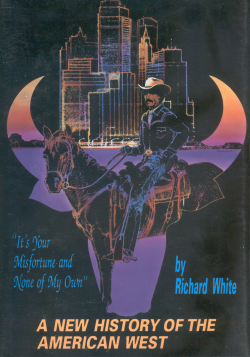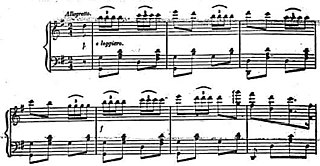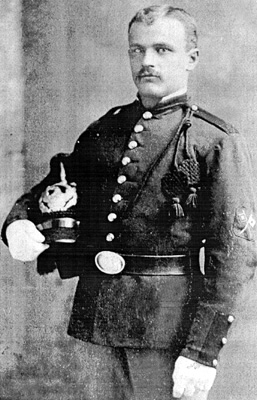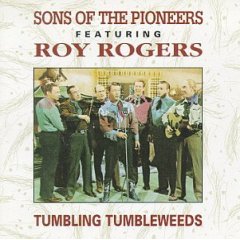Related Research Articles

John Avery Lomax was an American teacher, a pioneering musicologist, and a folklorist who did much for the preservation of American folk music. He was the father of Alan Lomax, John Lomax Jr. and Bess Lomax Hawes, also distinguished collectors of folk music.
"Home on the Range" is a classic cowboy song, sometimes called the "unofficial anthem" of the American West. Dr. Brewster M. Higley of Smith County, Kansas, wrote the lyrics as the poem "My Western Home" in 1872 or 1873, with at least one source indicating it was written as early as 1871.
Western music is a form of country music composed by and about the people who settled and worked throughout the Western United States and Western Canada. Western music celebrates the lifestyle of the cowboy on the open ranges, Rocky Mountains, and prairies of Western North America. Directly related musically to old English, Irish, Scottish, and folk ballads, also the Mexican folk music of Northern Mexico and Southwestern United States influenced the development of this genre, particularly corrido, ranchera, New Mexico and Tejano. Western music shares similar roots with Appalachian music, which developed around the same time throughout Appalachia and the Appalachian Mountains. The music industry of the mid-20th century grouped the two genres together under the banner of country and western music, later amalgamated into the modern name, country music.

The American Folklife Center at the Library of Congress in Washington, D.C. was created by Congress in 1976 "to preserve and present American Folklife". The center includes the Archive of Folk Culture, established at the library in 1928 as a repository for American folk music. The center and its collections have grown to encompass all aspects of folklore and folklife worldwide.
"Streets of Laredo", also known as "The Dying Cowboy", is a famous American cowboy ballad in which a dying ranger tells his story to another cowboy. Members of the Western Writers of America chose it as one of the Top 100 Western songs of all time.

"It's Your Misfortune and None of My Own": A New History of the American West is a history of the American West. The book's title comes from the lyrics to the traditional cowboy ballad Git Along Little Dogies. The 684 page history was written by Richard White and first published by the University of Oklahoma Press in 1991. It covers the history of the West from the Spanish conquest in the 16th century to the presidency of Ronald Reagan.

"Buffalo Gals" is a traditional American song, written and published as "Lubly Fan" in 1844 by the blackface minstrel John Hodges, who performed as "Cool White". The song was widely popular throughout the United States, where minstrels often altered the lyrics to suit local audiences, performing it as "New York Gals" in New York City, "Boston Gals" in Boston, or "Alabama Girls" in Alabama, as in the version recorded by Alan Lomax and Shirley Collins on a 1959 field recording trip. The best-known version is named after Buffalo, New York.
John I. White was a western music singer. He was born in 1902 and originated from Washington, DC. Working under various stage names, such as the Lone Star Ranger,the Lonesome Cowboy, and most often Whitey Johns he flourished as a performing and recording artist in the 1920s and 1930s. His first recordings were for the American Record Company and were released on a wide variety of record labels. He frequently performed covers of songs written by Vernon Dalhart. His most famous recordings were two of his last, "Whoopee Ti Yo Yo, Git Along Dogies" and "The Strawberry Roan" issued under his proper name, John White.

Historical America in Song, released in 1950 by Encyclopædia Britannica Films, is an album set by folk singer Burl Ives. Each of the six albums consists of five 12-inch vinylite records, for a total of thirty 78 rpm records. Each album has its own cover with a drawing of the Washington Monument on it.

Cowboy Songs is the sixteenth album by American singer-songwriter Michael Martin Murphey and his first album of cowboy songs. The album peaked at number 25 on the Billboard Top Country Albums chart.
"The Ballad of Casey Jones", also known as "Casey Jones, the Brave Engineer" or simply "Casey Jones", is a traditional American folk song about railroad engineer Casey Jones and his death at the controls of the train he was driving. It tells of how Jones and his fireman Sim Webb raced their locomotive to make up for lost time, but discovered another train ahead of them on the line, and how Jones remained on board to try to stop the train as Webb jumped to safety. It is song number 3247 in the Roud Folk Song Index.
"On the Trail of the Buffalo", also known as "The Buffalo Skinners" or "The Hills of Mexico", is a traditional American folk song in the western music genre. It tells the story of an 1873 buffalo hunt on the southern plains. According to Fannie Eckstorm, 1873 is correct, as the year that professional buffalo hunters from Dodge City first entered the northern part of the Texas panhandle. It is thought to be based on the song Canaday-I-O.
"The Little Old Sod Shanty On The Claim" is an American folk song written by Oliver Edwin Murray of South Dakota. It appeared somewhere around 1880 published in several American newspapers. The printings suggested that it be sung to the tune of "The Little Old Log Cabin In The Lane" written by Will Hays in 1871. The song tells of the trials of homesteading on the Great Plains and became immensely popular among the settlers. The title comes from variations of a refrain found in the verses and the chorus:

Will Croft Barnes, a private in the U.S. Army Signal Corps, was distinguished for his action in the battle at Fort Apache, Arizona Territory on September 11, 1881. When Fort Apache was besieged by warriors of Geronimo, Barnes escaped and rode to Fort Thomas. Soldiers from Fort Thomas came to the aid of Fort Apache. For his gallantry, Barnes received the Medal of Honor on November 8, 1882, the citation noting his "bravery in action."

"Tumbling Tumbleweeds" is a Western music song composed by Bob Nolan, a founding member of the Sons of the Pioneers. Nolan wrote the song in the early 1930s while he was working as a caddy and living in Los Angeles. It was first recorded by the Sons of the Pioneers in 1934, and it became one of the most famous songs associated with the group. Originally titled "Tumbling Leaves", the song was reworked into the title "Tumbling Tumbleweeds" and into more widespread fame with the 1935 film of the same name starring Gene Autry. Members of the Western Writers of America chose it as one of the Top 100 Western songs of all time.
"Cow Cow Boogie (Cuma-Ti-Yi-Yi-Ay)" is a "country-boogie"-style blues song, with music was written by Don Raye, and lyrics were written by Benny Carter and Gene De Paul. The song was written for the 1942 Abbott & Costello film Ride 'Em Cowboy, which included Ella Fitzgerald as a cast member.
Cowboy Songs may refer to:
"The Old Chisholm Trail" is a cowboy song first published in 1910 by John Lomax in his book Cowboy Songs and Other Frontier Ballads.

James "Iron Head" Baker and Moses "Clear Rock" Platt were African American traditional folk singers imprisoned in the Central State Prison Farm in Sugar Land, Texas. The men made a number of field recordings of convict work songs, field hollers and other material with John Lomax for the Library of Congress Archive of American Folk Music in the 1930s.

Cowboy Songs is a compilation album of phonograph records by Bing Crosby released in 1939 featuring Western songs.
References
- ↑ Western Writers of America (2010). "The Top 100 Western Songs". American Cowboy. Archived from the original on 19 October 2010.
- ↑ Cassidy, Frederic Gomes, and Joan Houston Hall. "dogie" Dictionary of American Regional English. ISBN 978-0-674-20511-6 June 4, 2009
- 1 2 3 White, John I. (1975). Git Along, Little Dogies: Songs and Songmakers of the American West . University of Illinois Press. p. 22.
- ↑ Lomax, John A. (1910). Cowboy Songs and Other Frontier Ballads. New York: Sturgis & Walton. p. 87.
- ↑ "A Bing Crosby Discography". BING magazine. International Club Crosby.
- ↑ Eder, Bruce. "New Frontier Review by Bruce Eder". Allmusic.
- ↑ "Git Along Little Dogies (Whoopee Ti Yi Yo)". Spotify.